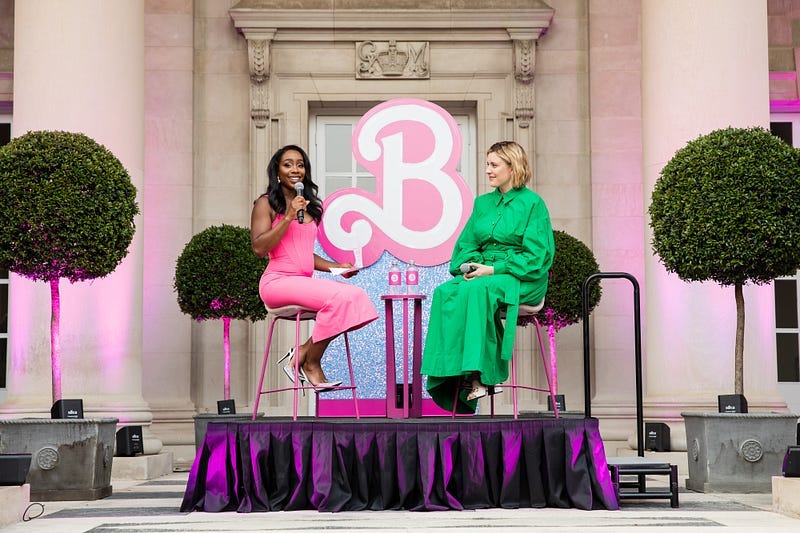Does Anyone Else See the Glaring Problem in the New Barbie Movie?
The film's anti-patriarchy message leads to more patriarchy
My wife and I saw Barbie with my mother-in-law last night.
It wasn’t hard to drag me out — I’m a big fan of the director and can’t wait to see what she does with the Narnia franchise.
Barbie was fabulous.
If the set designer doesn’t win the Oscar for best set design, it’s time to stop giving out film awards.
I’ve never seen a cinema so packed on a Monday night. Ever.
I’ve never seen so much pink in a movie theater. Even on the dudes.
It was real “event cinema.”
The movie itself was hilarious.
Margot Robbie never once dropped the ball.
Kate McKinnon stole every scene she was in.
Ryan Gosling is at his best when playing goofy roles. (Remember The Big Short?)
Even Mattel let the filmmakers take the mick out of them.
There was only one problem with the new Barbie movie that all the critics missed:
The message of the anti-patriarchy film inevitably leads to more patriarchy.
One thing director Greta Gerwig and her co-writer husband get right is to avoid the false dichotomy between patriarchy and matriarchy.
When given two bad choices, choose neither.
But spoiler alert, here’s the supposedly-meaningful epiphany that Barbie and Ken discover nearly simultaneously:
It’s not Barbie & Ken.
It’s Barbie and Ken.
As in, they don’t end up together.
They part ways, each setting off on a journey of self-exploration to discover their “true selves.”
Alone.
Isolated.
Autonomous.
“Free.”
No wonder Millennials are so depressed and devoid of meaning.
The philosophical conclusion of Barbie is: The patriarchy is bad and the only way out is more hyper-individualism.
Let’s play that out and see how it ends.
“Autonomy comes from the two Greek words autos, meaning “self”, and nomos, meaning “law.” Someone who is autonomous is a law unto themselves. He has no restraints whatsoever. An autonomous person can do or be whatever he wants, whenever he wants, however he wants. That ultimately leads to total chaos because if I’m a law unto myself and another person’s “law unto themselves” conflicts with my law, who will decide who’s right?” — Abdu Murray
The moral point of Barbie is to reject the patriarchy, not necessarily embrace the matriarchy, but definitely find your own way and meaning and truth.
The film makes no mention of the fact that homo sapiens are communal creatures shaped by others. No mention that we are highly social interdependent beings with varying strengths and weaknesses. No mention that absolute truth rationally has to exist and we don’t just get to make up our own rules.
Autonomy. This is the typical definition of American freedom, and it’s proven to be an unmitigated disaster. Modern American “freedom” — autonomy — is actually a collective anti-freedom.
This is where I have no choice but to quote Christian apologist Abdu Murray again:
“We talk about freedom all the time, but we’ve stopped talking about freedom a long time ago. Now we’re talking about autonomy. Freedom is different than autonomy. Freedom has boundaries. Truth is one of those boundaries. And morality is one of those boundaries. Autonomy is the ability to do whatever you want whenever you want in whatever way you want. The problem is this: If I’m autonomous and another person is autonomous, and I have preferences and those matter more than the truth, and that person has preferences and their preferences matter more than the truth, when two autonomous preference-seeking beings come together and their preferences don’t match, who is going to win? If truth is on the bottom shelf, truth won’t decide. What will decide will be power. And isn’t it ironic that in our quest for “freedom”, someone gets enslaved?”
Let’s say the Barbies throw off the shackles of patriarchy.
And then magically somehow manage to practice enough selflessness to not immediately seize power for themselves.
But the Barbies tell everyone to discover their true selves, seek their own truth, find their own individualist way.
What happens when a bunch of autonomous individuals have clashing desires?
The strongest prevail.
The corporations take over.
The dictators and tyrants rule.
The Kens win again.
If you love movies, get dressed up in breast-cancer-pink and go see Barbie in cinemas. Stuff your face with overpriced popcorn and laugh until you snort.
But ignore the movie’s meaningless Millennial message.
If you want true freedom, you don’t need more hyper-individualism.
You need rootedness in a community of healthy people who are selfless enough to sacrifice some of their own rights and preferences for the flourishing of others. You need to seek and find the actual truth. You need to stop pretending like you can do it all on your own. You need Jesus and His family.
We were made for each other.
It’s not Barbie and Ken.
It’s Barbie & Ken & you & me & everybody else in this wicked and wonderful world.
Recommended summer reading: My new myth-busting biography explores the radical politics, economics, and philosophy of history’s most influential revolutionary.


